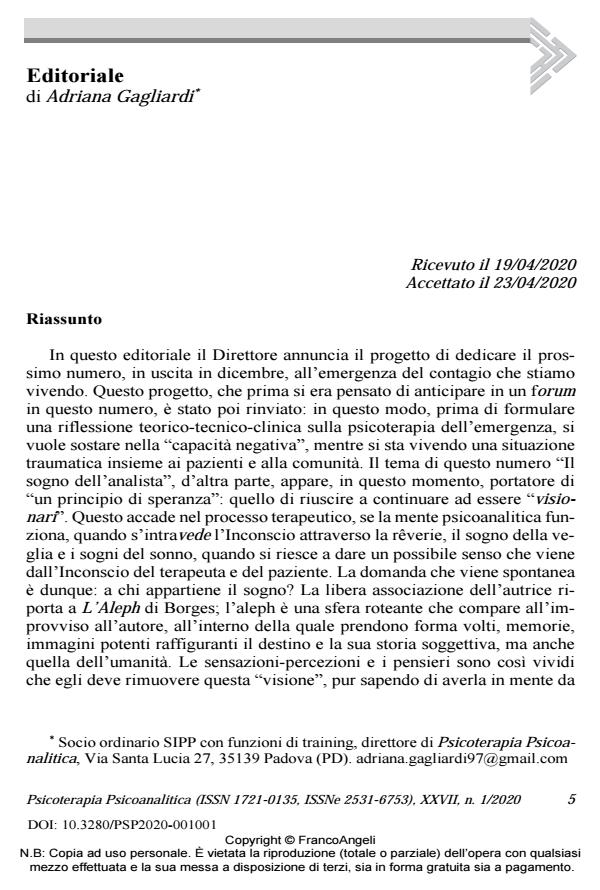Editorial
Journal title PSICOTERAPIA PSICOANALITICA
Author/s Adriana Gagliardi
Publishing Year 2020 Issue 2020/1
Language Italian Pages 9 P. 5-13 File size 168 KB
DOI 10.3280/PSP2020-001001
DOI is like a bar code for intellectual property: to have more infomation
click here

FrancoAngeli is member of Publishers International Linking Association, Inc (PILA), a not-for-profit association which run the CrossRef service enabling links to and from online scholarly content.
In this editorial, the Director announces the plan to devote the next issue of the Journal - to be published in December 2020 - to the emergency we are living right now. Originally, the editorial board had considered devoting a forum to this subject in this very issue, but then the project was postponed. Before producing a theoretical, technical and clinical reflection on emergency psychotherapy, we want to dwell on the "negative capacity" while experiencing a traumatic situation with our patients and the community as a whole. However, the theme of this issue: "The analyst’s dream", currently appears to be offering a "principle of hope", that is, the possibility to safeguard the ability to be visionary. In the therapeutic process, this is possible when a psychoan-alytic mind is at work, when the unconscious can be gleaned through reveries, daydreaming and night dreaming, when meaning can be found through the therapist’s and the patient’s unconscious. One ques-tion arises naturally: whom does a dream belong to? The Author’s free association leads to Jorge Luis Borges’ The Aleph, a revolving sphere that suddenly appears to the narrator. Faces, memories, powerful imag-es depicting destiny and his personal history, but also the history of humankind, take shape in it. His perceptions, feelings and thoughts are so vivid that he has to set this "vision" aside, even though he knows that it will keep on lingering somewhere in his mind. Intuition, vision and the ultimate truth can "appear" in our mind but then, they have to linger in the background as a starting point, not as a point of arrival. Subjective truth needs to be rediscovered day by day. A short presentation is offered for each paper in this issue: topics include dreaming with a patient, on a patient, on oneself, while drawing upon one’s own mind, one’s passions or one’s personal, free associations with art, literature and music. All these papers prove that dream work is a creative act touching upon every analyst’s passions and desires: an act that is rooted in the analyst’s working and processing mind set in relation with one’s subjective interests and the mystery of encountering the Other.
Keywords: Dream, rêverie, ability to be visionary, principle of hope.
Adriana Gagliardi, Editoriale in "PSICOTERAPIA PSICOANALITICA" 1/2020, pp 5-13, DOI: 10.3280/PSP2020-001001